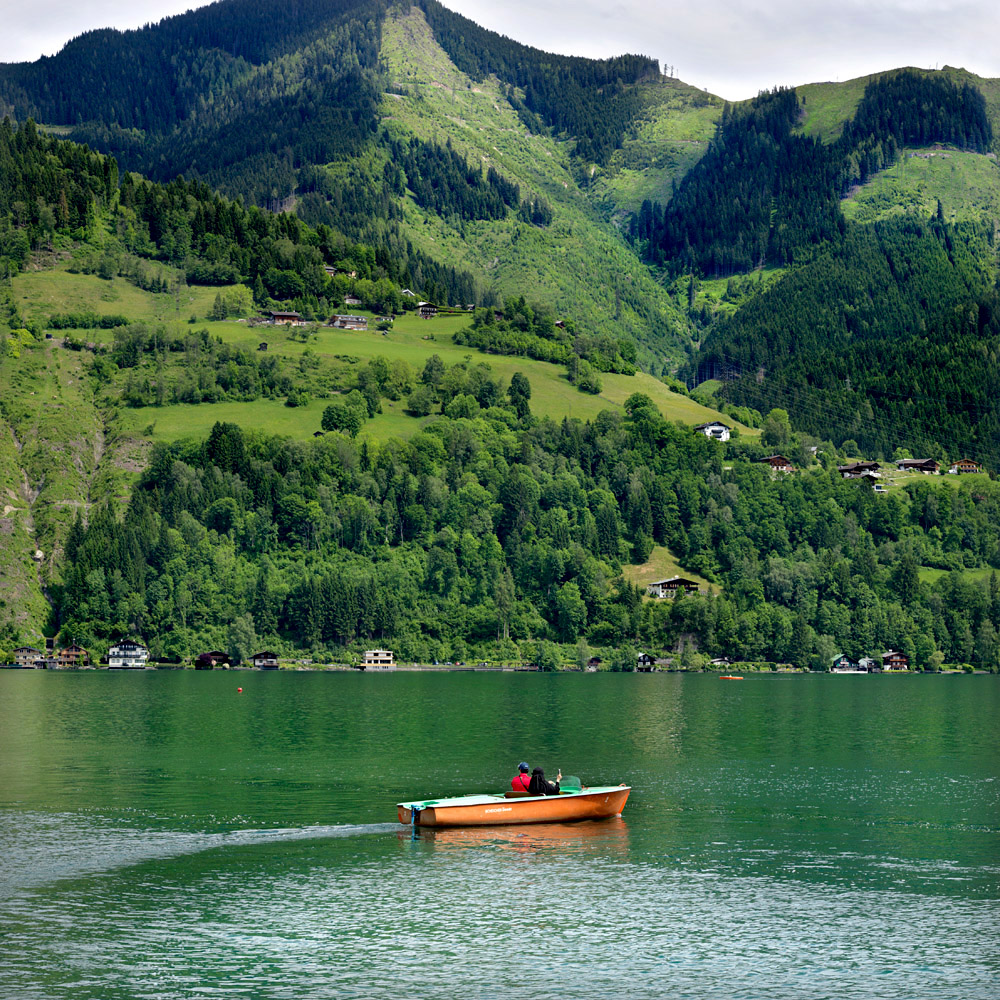DAS PARADIES
In summertime, when the temperatures in the Gulf State scan easily reach 50 degrees Celcius, it’s inhabitants travel to one of their favorite ‘cooling’ destinations: the Austrian village Zell am See. It receives more than 70.000 Arabic tourists per year.
Journalist Saskia Adriaens and I joined the tourists for a short holiday too.
Published in: Volkskrant Magazine (NL), The Guardian (UK), The National (UAE), Lenscratch (US), Business Insider (US), De Morgen (BE), Ouest France (FR), Algemeen dagblad (NL), Tages Anzeiger (CH), CNN Amanpour (UK), Wired (US), Featured on Fotostudio de Jong, 26 min (NL), and exhibited in a web project of Museo Nazionale Della Montagna (IT)
3th prize Zilveren Camera 2015.
'DAS PARADIES'
The sweet Heidi-like landscapes lies serenely in the springtime sun. Goats graze on the green quilted blanket. The pointy, white tops of the Alps stick out sharply against the bright blue sky. In the ripple-less lake of Zell am See the painting-like mirrored image is visible. "This is paradise as the Quran intended."
By Saskia Adriaens
It is an often-heard answer from the Arabic tourists to the question of how they came up with the idea to come to the Alps for their vacation. An important reason, but more than often the response is ‘cooling,’ because the summer temperatures in the Gulf States can easily reach 50 degrees Celsius (122 Fahrenheit) and remaining inside is the only available option.
Groups of German pensioners stroll using their walking sticks along the lakeside. The terraces are filled with middle-aged tourists and older. Beige zip-off pants, a fleece zippered sweater, short haircut, and big climbing boots. Men and women who all seem to look alike. Enjoying a wiener schnitzel or ‘kaiserschmarrn’ they look up in surprise as a woman walks by dressed in black from top to toe. Only her eyes are visible.
She is not the only one. “It looks like the Emirates here,” a German tourist can be heard saying to his wife. He motions with his head in the direction of a woman who takes a large telephone on a gold chain from out of her niqab.
For ten years now the surroundings of Zell am See have been big attractions for tourists from the Gulf States: each year 70,000 Arabic tourists will spend their vacations here in Austria. Following the German tourists the Arabic tourists are the second most important source of income for the region. The mountains, the lake, the white peaks and the green are for the tourists from Saudi Arabia, the United Arab Emirates, Oman and Iraq a ‘must see’ for several years now.
Turki from Saudi Arabia
“What New York is to Westerners, Zell am See is for the Arabs. Here is where you must go and then proudly tell that to your friends and family,” says Hatam. He is a lawyer in Oman and is on holiday with his wife Fouzia. They have been together for eight years and have saved for this trip for years. “On Facebook and Twitter this place is promoted. Everyone wants to come here.” While the tourists around them are ordering sodas and beer, they are drinking hot chocolate topped with whipped cream.
Within a few square kilometres there are three Arabic restaurants located. Other typical Austrian restaurants offer alongside the pork schnitzel also a turkey schnitzel. Many menus are in Arabic with pictures of a chicken, cow, fish or vegetable.
The influx of the Islamic visitors is an enormous economical boost for the region, but also is a source of controversy. Because while the Arabic tourists bring a great deal of money into the cash drawers of the hotel owners and restaurateurs, ever more German visitors are staying away.
“It is a difficult theme,” a female grocer confides to us. She wants to respond, but only anonymously. “I must say that in the beginning, I wasn’t cheering about the situation, but I have now grown accustomed to it. They are just regular people after all.” Then she points to the large hams hanging on ropes in the store’s display window. “That is looked upon with condemnation. They come here especially for honey, since according to the Quran that is said to be healthy. And they always want to haggle about the price too, but here we have set prices.”
This spring the bilingual brochure entitled ‘Where cultures meet’ was meant to close the culture gap. In eight pages it is politely explained to the Arabic tourists that it is not appreciated to cook in the hotel rooms. That the maximum speed must be observed on the roadways. That trash must be deposited into the designated trash cans. That black clothing is especially associated with mourning and that it is important to be able to see one another’s faces: ‘Let us see your smile.’ The brochure was withdrawn after only a month because of negative international media about this action.“
My wife decided that she was going to remove her face cover since she felt everyone was staring at her. But now she says that she feels naked like this,” says the 26-year-old Turki from Saudi Arabia at the party ‘Zell Edelweisen,’ which was specially organized to allow the tourists to become accustomed with the Austrian traditions. His 22-year-old wife is pregnant with their second child.
It is the first time that they have been on holiday together. “It is for us the complete opposite world. Here people stare at the women wearing a niqab. In our country we would look strangely upon women like yours.”
Shortly after that Turki is called up onto the stage to take part in a yodelling contest. He does a good job and ends up in second place. “This is the best place in the world!” he says enthusiastically.
Nouria, Mohammed, May and Deem from Saudi Arabia




















